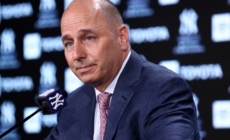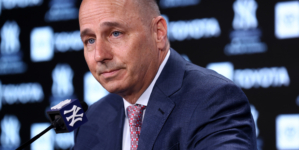-
Fan-Favorite WWE Superstar Is Set To Return: Report - 20 mins ago
-
Smithsonian Museum Director Trump ‘Fired’ Decides to Step Down - 51 mins ago
-
Mom Spent Months on ‘Deeply Personal’ Artwork, Took Son Seconds To Ruin It - 55 mins ago
-
Los Angeles braces for weekend of ‘No Kings’ protests - about 1 hour ago
-
Yankees GM Offers 4-Word Response on Poaching Breakout Contributor From Rival - about 1 hour ago
-
Mamdani and Lander Will Cross-Endorse Each Other in N.Y.C. Mayor’s Race - 2 hours ago
-
WWE Superstar Signs New Contract - 2 hours ago
-
Israel Attacks Iran - 2 hours ago
-
Autonomous Shuttles Are Popping up Across America in Time for the World Cup - 3 hours ago
-
They Asked ChatGPT Questions. The Answers Sent Them Spiraling. - 3 hours ago
AAMC Director on NIH cuts: “Health Will Suffer”
This is a preview of Access Health—Tap here to get this newsletter delivered straight to your inbox.
I’m back from my week-long stint in the Mediterranean, which was spent marveling over fresh tomatoes, velvety olive oil and coastlines worthy of a storybook. Although my managing editor may have been skeptical, I truly meant it when I told him I was happy to be back at work. There’s a lot going on in U.S. health care right now, and even ~4,700 nautical miles of distance couldn’t get the news off my mind.
One conversation in particular has been consuming my thoughts over the past several days. On May 27, I spoke with Dr. Sarah Rossetti, associate professor of biomedical informatics and nursing at Columbia University Irving Medical Center in New York City. The government recently cancelled $400 million in federal funding to the university—bringing her 15-year research project to an abrupt halt.
Rossetti had been working on the CONCERN Study, which had successfully developed an AI model to detect patient deterioration in the hospital setting. The model could identify risk two days earlier than other models that had attempted to predict bad outcomes; CONCERN differentiated itself by tapping into nurses’ practices and detecting patterns of concern in their documentation.
The study had been receiving funding from the National Institutes of Health (NIH) for about nine years, and had just published its largest research paper to date in Nature Medicine—demonstrating that throughout a multi-site clinical trial, the AI model had decreased mortality risk by 35 percent, cut sepsis risk by 7.5 percent and shortened length of stay by more than half of a day.
Then, on a Monday night in March—at around 10 p.m.—the government email came through, alerting Rossetti’s team that their funding was slashed.
The email did not give any reasoning or provide clarity on the cuts, Rossetti said. She thought that the word “bias,” an important scientific consideration for the evaluation of AI models, may have been confused for a DEI concept and flagged by the Trump administration.
“There’s really nothing controversial in the work that we’re doing, the methods we’re using,” she told me. Newsweek reached out to the NIH on Wednesday afternoon and will update the web version of this newsletter if we receive a comment.
Although the research team is exploring new funding avenues, it won’t happen overnight, Rossetti added. It takes a long time to submit one grant proposal, and it took three tries to get the original NIH funding for the CONCERN Study. Leaders fear that they won’t be able to sustain their teams in the interim—and not just at Columbia, but at academic medical centers across the country.
Yesterday, the Association of American Medical Colleges (AAMC) put out a report addressing the cumulative impact of the federal government’s actions on academic medicine. So far in 2025, the administration has terminated 1,183 grants and $2 billion of biomedical research funding from U.S. medical schools and hospitals. It also flagged that 50 percent of medical students’ loans could be in jeopardy, and critical services that are often provided by academic medical centers—like burn centers, psychiatric services and trauma centers—could be at risk.
“The infrastructure that is required to keep an academic medical center moving forward relies on a partnership with the federal government that is closely linked to research, to medical education and to clinical care,” Heather Pierce, Senior Director for Science Policy at the AAMC, told me. “And so as different parts of the mission are impacted, you have to rely on other [parts]. That changes an institution’s focus and what they can staff, what they can move forward. All of those specialty areas are potentially at risk.”
There’s no substitute for that partnership, Pierce said (as so many other health care executives and researchers have agreed).
I’ve begun conceptualizing all this as a game of Jenga. Yes, our health care system is historically resilient. Yes, our country’s best leaders and brightest minds are at its helm. But there are only so many blocks you can pull before the whole tower tumbles. With each project like Rossetti’s that is wriggled from the infrastructure, the foundation becomes increasingly unstable. And with every executive order and every Congressional decision, health care leaders’ own moves get more precarious.
You can view the full AAMC report here—and read on to the Pulse Check section for more of my interview with Pierce.
Essential Reading
- Hospitals are increasingly standing up digital command centers to improve efficiency and oversight of both in-person and virtual services. In my latest deep dive, I connected with four hospitals to learn how these NASA-esque hubs are improving their operations. Get the scoop here.
- HHS has removed all 17 members of the Advisory Committee for Immunization Practices, which is responsible for advising the CDC on vaccine safety and protocol. The 17 sitting members were appointed by the Biden administration. In a HHS news release, Secretary Robert F. Kennedy Jr. said the move was “prioritizing the restoration of public trust above any specific pro- or anti-vaccine agenda.”
- But health care leaders and clinicians have expressed grave concerns about the unprecedented action—and its potential impacts on immunization schedules and vaccine accessibility. The director of Brown University’s Pandemic Center laid out the possible consequences in an interview with Scientific American.
- The Coalition for Health AI (CHAI) has partnered up with the Joint Commission to co-develop AI playbooks, tools and a new certification program for U.S. hospitals and health systems. Their first guidance will be available in the fall of 2025, followed by AI certification. Read more about the partnership here.
- If you’re interested in learning more about CHAI’s work, I encourage you to watch Newsweek’s recent webinar on AI governance, featuring CEO Dr. Brian Anderson.
- UnitedHealth Group’s saga continues as the health care giant considers bids that would allow it to exit from Latin America, Reuters reported on Monday. The company lost more than $8 billion in the market last year and has been trying to leave it since 2022—but the situation has grown more urgent in recent months amid leadership shakeups, criminal probes and public discontent, per two unnamed sources.
Pulse Check

AAMC
Usually, I do a Pulse Check with a CEO in the industry—but this week, I felt that the AAMC’s report deserved some extra attention. Below, find a portion of my interview with Heather Pierce, Senior Director for Science Policy at the AAMC.
Editor’s Note: Responses have been edited for length and clarity.
Heather, the report details a number of critical programs that academic medical centers rely on—and that are currently at risk of being cut by the federal government. When you talk to your member organizations about all of these issues, what are their reactions? What are their primary concerns right now?
The mission of academic medicine is to improve the health of all.
Leaders of institutions are looking at these changes, these actions that are impacting their institutions—some in ways that they can understand and calculate, and some that at this point are still highly speculative. But when put together, [these changes] will cause those institutions to have to make difficult choices about where they focus their resources and attention.
It’s not just about the institution, because those institutions, of course, have an impact on their local economy. They’re usually main economic drivers of the area around them. When we look at the cumulative effect across all institutions, we realize that ultimately, health will suffer and health will not improve in the way that it could. The research that takes place at one institution has potential benefits for the individuals that are there, that are involved in those clinical trials and other research. But the results of that research, of course, are not limited in any way to the patients of that institution or that local area or that state, but are used to develop clinical guidelines and best practices that are implemented nationwide. All of that is at risk now.
Have your members been able to forecast the potential impacts of cuts in each of these areas, from Medicaid to scientific research? Are they making any proactive changes or taking preventative measures?
They’re all engaged in predictive modeling, trying to figure out exactly what is happening and what the impact would be for each of them. At this moment, it differs from institution to institution. Some institutions have been directly targeted.
Some have seen bigger cuts than others to their research mission, and many have been forced to make really difficult and devastating decisions about their future workforce—how many graduates should they be taking on next year if half of their NIH grants are cut? What happens with the postdoctoral scholars that are here on international visas, or those that are that are helping to contribute to labs whose funding is in question? Those kinds of decisions are being made on a day-to-day basis, while institutions are doing their best to preserve the current and future generations of physicians, scientists and educators.
C-Suite Shuffles
- Allison Viramontes is the new CFO of Jupiter Medical Center. She joins the independent Florida health system from Mayo Clinic Arizona, where she most recently served as CFO.
- Sutter Health, based in Sacramento, California, has named Dr. Ashley Beecy its chief AI officer. She previously worked as medical director of AI operations at NewYork-Presbyterian.
- Dr. John Whyte has stepped down from his role as chief medical officer at WebMD to become CEO of the American Medical Association.
Executive Edge

Carrum Health
Sach Jain is the founder and CEO of Carrum Health, a value-based care platform providing specialty care through a Centers of Excellence (COE) network. Under Jain’s leadership, the company has grown to include more than 1,100 COEs since 2014 and has helped employers curb the cost of specialty care procedures by up to 45 percent.
In addition to leading Carrum Health and navigating the complicated payer-provider ecosystem, Jain is a parent, and travels frequently to headline executive roundtables and industry conferences. This week, I asked how he maintains healthy habits and balance within his schedule.
He told me that he works to incorporate lifestyle habits across three pillars: nutrition, exercise, and mental health. Here’s what he does to keep them all in check:
- Nutrition: “I start most days—five or six days a week—with oatmeal. It’s become a reliable routine. For lunch during the workweek, I go for salads as much as possible. I tend to eat small portions overall. When I travel and it’s difficult to avoid fancy meals, eating small portions is really helpful. Dinner is usually home-cooked during the week, and we often will eat out on weekends. I call it collecting points during the week and spending them on the weekend. I also avoid eating after 8 p.m. to ensure I give myself the best chances of a restful, full night’s sleep. I love my wine but limit alcohol to just one drink a week, even in social settings and while traveling.”
- Exercise:“I run about three times a week for about an hour— usually along the coast in San Diego. I typically use that time to listen to podcasts and that’s my best trick to tune out from work. We also have a basic gym at home that I use a few times a week, focusing on weights and stretching. On days I don’t run, I usually take a long walk after dinner. I also try to hit a few tennis balls when the schedule allows.”
- Mental Health: “I give myself digital silence from Friday evening to Sunday morning—no emails or Slack. Sunday afternoons are for planning, reflection, and deep work. I’ve followed this practice for over a decade. It started during my consulting days when Monday [to] Thursday were always travel days, so you had to get your ducks in a row on Sunday before you took off on Monday morning. I spend time with my family in the mornings before school, and we eat dinner together most nights. I make sure that Saturdays and Sunday mornings are fully reserved for family and friends.
- I avoid days packed with non-stop meetings—they can be exhausting and unproductive. As Carrum has grown, my role has also evolved. I’m more selective now about where I devote time. I try to shoot for fewer but more meaningful meetings, as much as possible.”
This is a preview of Access Health—Tap here to get this newsletter delivered straight to your inbox.
Source link


















